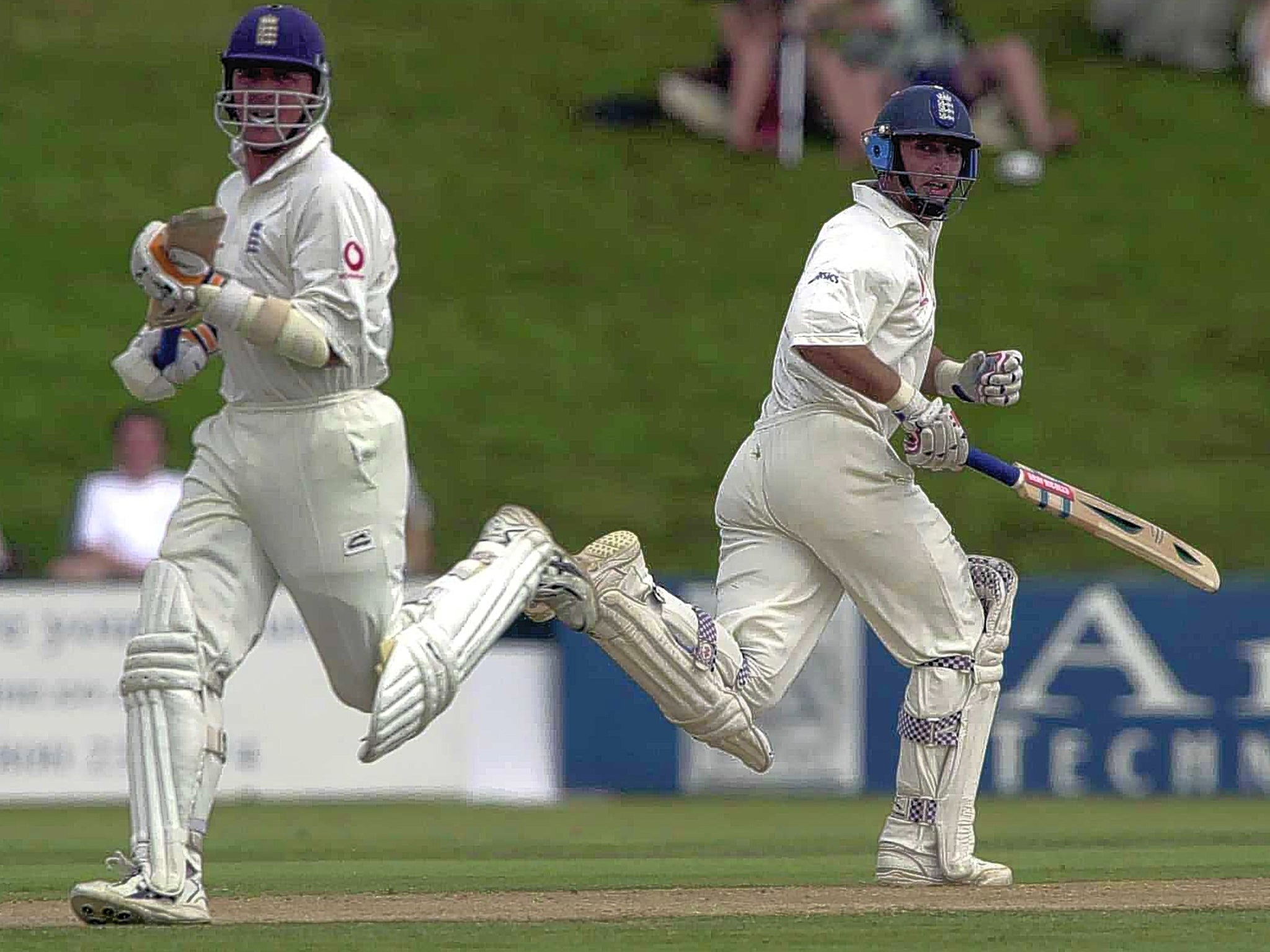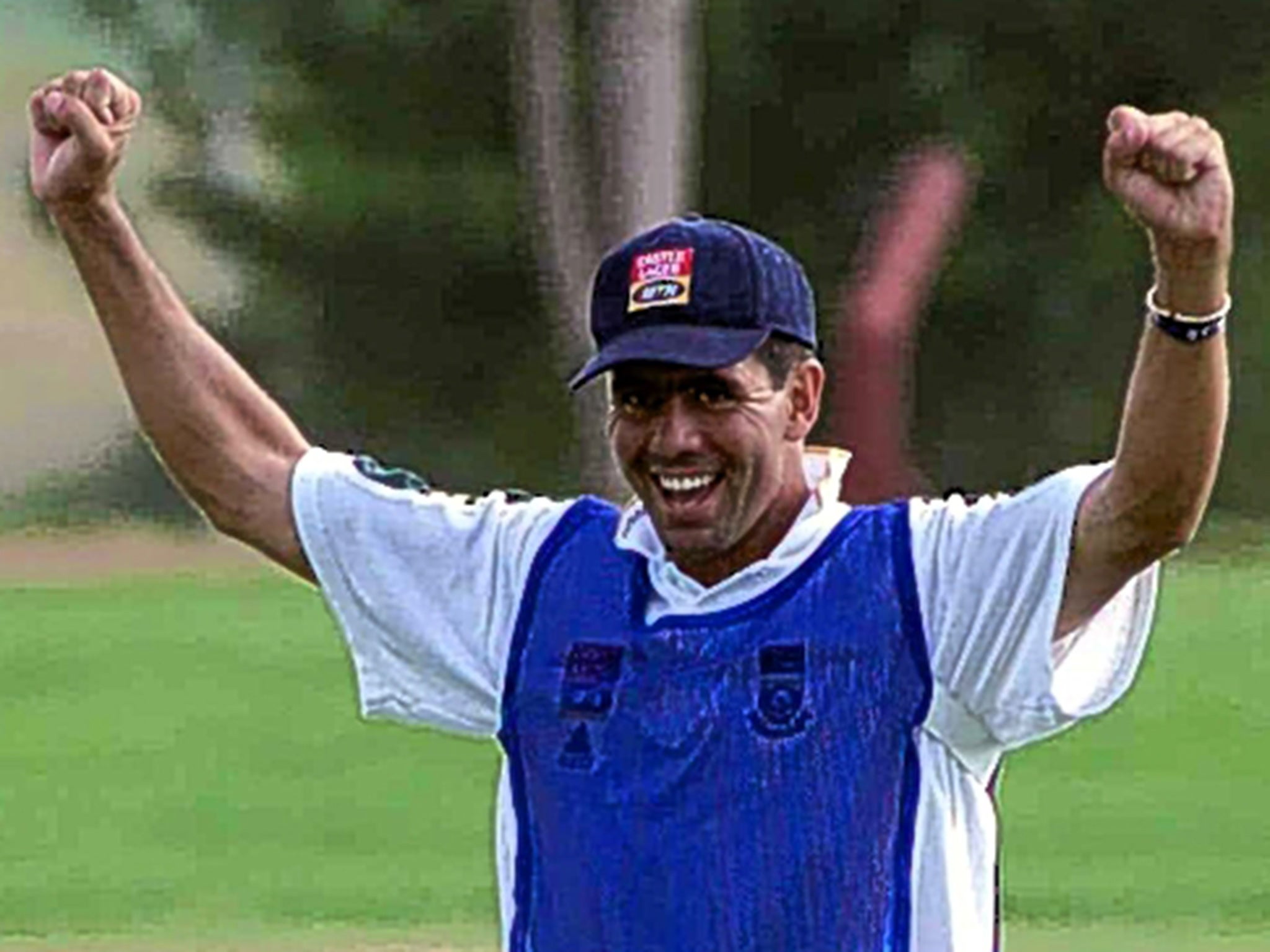South Africa vs England: Hansie Cronje went to hell for leather on one of Test cricket's darkest days
Sixteen years ago South Africa’s cautious captain sold his soul at Centurion and launched the great match-fixing scandal by giving England a chance. Richard Edwards looks back at a bizarre match.

Few walking into Centurion Park on a bright, warm January day in 2000 expected anything other than a tame end to a Test ravaged by the weather. South Africa had been stuck on 155 for 6 since the opening day and three days of solid Gauteng rainfall appeared to have signalled the end of both the Test and a series in which England had been comprehensively second best.
The chances of a result were virtually nil – a presumed reality that had led to Darren Gough spending the night before enjoying an enthusiastic drinking session with the Welsh golfer and 1991 Masters winner Ian Woosnam.
While Gough was throwing up in the dressing room before England took the field to supposedly administer the last rites to the Test match, however, South Africa’s then captain, Hansie Cronje, was planning to change those odds considerably.
A little later, with South Africa’s first innings standing at 248 for 8, England captain Nasser Hussain nipped off the pitch for an apparent toilet break before meeting Cronje at the back of the pavilion to agree a target for an England side that had had precious little to cheer since arriving in the country in November.
Defeats in the Johannesburg and Cape Town Tests by an innings hardly signalled the start of a brave new era hoped for under the freshly installed coach Duncan Fletcher. Hussain was initially reluctant to agree to any innings forfeit – the first in 123 years and 1,483 matches – in an attempt to force a result but ,with the outfield quickening and the Centurion pitch betraying no demons, he eventually accepted the opportunity to chase down an eminently achievable target offered by Cronje, a captain previously renowned for being as risk-averse as any in history.
“We had had three days off for rain and we came to the ground on the final day thinking that nothing was going to happen,” says Chris Adams, who made his debut in that series and whose appearance at Centurion was his fifth and last Test for his country. “Some people in that dressing room might now say that they thought there was something going on but I don’t remember people saying that was a bit dodgy, a bit strange.
“It was unusual, and when you’re faced with something that has never happened in the game before then it obviously stands out, but I certainly don’t remember being in earshot of people who were suggesting that this was anything untoward and certainly nothing to do with match-fixing or taking reward for creating a situation.”
Indeed, when Cronje declared the South African innings, England forfeited their first innings and the home side forfeited their second, praise rather than vitriol or suspicion was the overwhelming feeling around a ground suddenly buzzing with anticipation at the most unexpected run chase imaginable.
Despite concerns from the ICC, the game’s governing body, that the actions of South Africa’s captain were not within the “spirit of the code of Test conduct”, the then Proteas coach, the late Bob Woolmer, felt that Cronje’s decision had injected fresh life into cricket’s most prestigious format.

“Hansie did the game the biggest favour imaginable at the dawn of the new century,” he said. “I am certain it will lead to other captains thinking along the same lines.”
History has obviously proved otherwise. Little did everyone in the stands know, Cronje had taken a bribe of £5,000 and, bizarrely, a leather jacket in exchange for guaranteeing a positive result in the Test match.
But Woolmer, who was found dead in his hotel room in Jamaica during the 2007 World Cup in the Caribbean, was speaking without the benefit of hindsight. For the England players in the dressing room on that sun-drenched day, they had little time to consider the long-term impact of Cronje’s largesse. There was a game to be won.
“It was a very gettable target,” says Adams. “I came in in what was very much a one-day situation. We were three down for about 90 and Nasser had just been out. South Africa had picked a young guy called Nantie Hayward for that Test. He had proper pace so I came in expecting the South African slips to be stood miles back.
“Their whole side had spoken Afrikaans for the entire series but when I took guard Mark Boucher was stood right behind me. I asked him what he was doing and he said, in perfect English, that he only thought it polite to come and welcome me ‘to the very last day of my Test career’.” They were prophetic words. Just 10 balls later Boucher took a catch off Hayward to dismiss Adams in his final Test innings.
It was Michael Vaughan who strode to the crease after Adams’ dismissal and his 69 off 108 balls, coupled with Alec Stewart’s well-paced 73, which eventually set up a victory that was, at the time, celebrated. A four from a now sober and clear-headed Gough eventually sealed the win.
The victory ended a 14-match unbeaten streak for the hosts and began a chain of events that would ultimately finish both Cronje’s career and his reputation. At his post-match press conference, Cronje responded to “whispers from the ICC” by saying: “I would be disappointed if this is the attitude and do not want to be part of the game if this is their thinking. As Test cricketers we have a duty to entertain and get full houses and this was far better than seeing spectators sitting there with long faces.”
The Independent’s then cricket correspondent, Derek Pringle, took a rather different view. “For those used to watching his strangling tactics in operation, the deal was completely out of character and cynics felt it smacked of a captain under pressure making a late bid to show his adventurous side.”
That said, there was little real suspicion that Cronje’s actions had been inspired by rather more selfish motives. Just over three months later, the real reasons behind his decision-making were laid bare to a disbelieving cricket world following recorded conversations between Cronje and an Indian bookmaker.
Cronje, it emerged, had been contacted by a bookie who was in danger of suffering huge losses if the match finished as a draw. He told Cronje that he would give $150,000 to charity if he could persuade England to agree to a final-day run chase.
Speaking at the King Commission inquiry in November 2000, Cronje said that the bookmaker “subsequently told me that it had been impossible for him to get any bets on the game. After the game, he visited me where we were staying, and gave me a leather jacket and 50,000 rand [around £5,000] in two cash amounts on consecutive days... He said it was in consideration of me giving him information in the future.”
The ramifications of Cronje’s decision-making on that fateful day are still being felt today, while those England players involved in one of cricket’s most shameful days feel similarly cheated.
Mike Atherton wrote in his 2002 autobiography that, even without knowing the real motivation behind Cronje’s decision, he felt “completely flat” when the winning runs were struck.
Hussain too, has said that he remains unsure as to which passages of play on that final day were genuine and which were contrived. “I don’t know which bits of that match were for real,” the then captain admitted. “I don’t know which runs were freebie runs and nothing annoys me more than that. You should have to earn runs and wins in Test cricket and it is that which sits badly with me.”
Adams, meanwhile, still struggles to believe the world Cronje had been drawn into. “Who would have thought that Hansie Cronje, who looked to be the cleanest, most forward-thinking cricket captain, would be in the situation he got himself in?” he says. “Nobody in that dressing room would have contemplated thinking that.”
Cronje would die in a plane crash in June 2002, by which time the result of the Centurion Test had long since faded into insignificance.
However, with England looking to complete a famous 3-0 series win at the same ground starting tomorrow, the light will doubtless again be shone on one of Test cricket’s darkest days.
Join our commenting forum
Join thought-provoking conversations, follow other Independent readers and see their replies
Comments